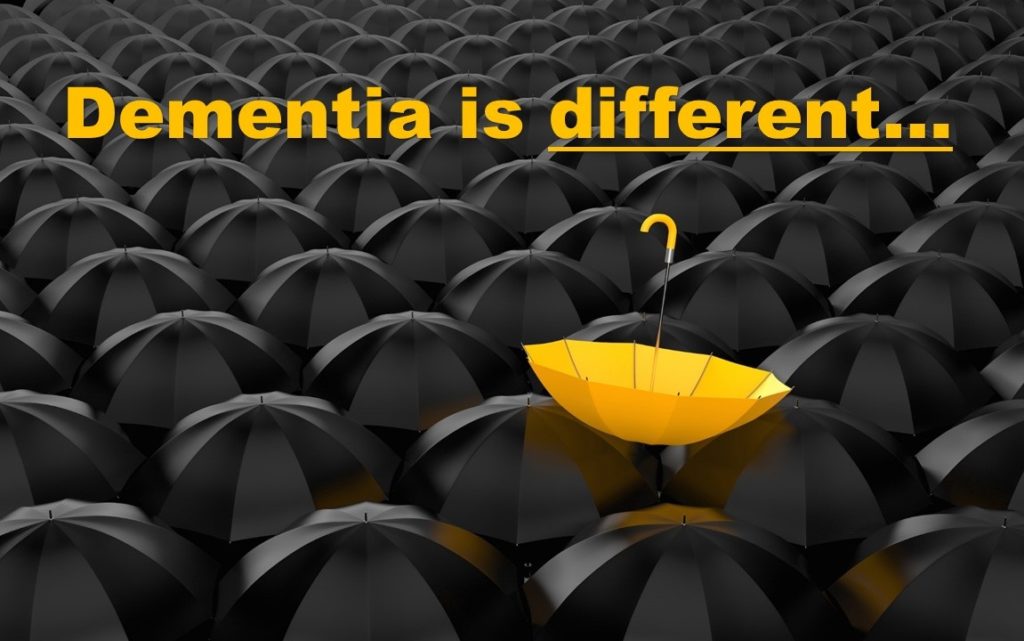
Dementia is Different to any other medical condition. Dementia is incurable, progressive and requires a unique brand of care. I have a passion for providing a different model of care within our hospitals and am looking to change the way people with dementia are treated in Australia.
Dementia has many symptoms,side effects and unique considerations and everyone has a different journey. With an ageing population we need to change the way hospitals provide their care and ,modify the environment to be dementia friendly. A person is diagnosed every 6 minutes in Australia and hospitals need to change their methods now to accommodate this growing problem.
In a perfect world this is how I would set up a hospital to admit people with dementia:
- Dementia patients would not have to enter through the ED (Emergency Department)- They would have a different pathway into the hospital with a quiet environment, dementia trained nurses, minimal stimulus and have more of a nursing home feel.
- Dementia patients would be greeted and comforted in a gentle way and attempts made to pacify and calm the person before any bloods or x-rays are taken. These tasks would be attempted after the person is either calm or de-escalated.
- The entry to hospital would be near the ED so the restraint team (security) can be utilised if required as a last option, not a first option. The security team would also be dementia trained and they would use a less is more approach both in member numbers and also physicality. Code blacks would be a last resort.
- The environment would not resemble a hospital ED but moreso a warm nursing home feel with dimmed lights, calm music and muted ambience. Medical equipment would be disguised or hidden and recliner chairs provided if the patient resisted the bed.
- Emphasis on ‘calming before treating’ would be the focus.
- If the person was admitted to a ward it would be a geriatric ward that is purpose built and once again resemble a nursing home feel. There would be minimal people in hallways and larger nurses stations. The bed buzzer/alarms would be muted near rooms, but audible in nurses station. A light would flash outside the room and over the bed.
- People with dementia would be in single sex rooms or small wards(with other people based on similar stages of dementia severity). Bathrooms would be dementia friendly with rails in showers, safety arms on toilets,heated bathrooms,exhaust fans, shelves for towels and toiletries, a shower head that can be used on or off the wall. Hygiene and cleanliness a priority. Hand gel would be accessible. Soft music would be piped into the bathrooms and frosted shower screens (or curtain) a must.
- Patient gowns would be dignified and keep people’s cheeks in check:)
- Patients with cognitive impairment would be identified by the new symbol outside their doors, near their beds and also on their medical file. Maybe a severity rating could also be adopted to allow for appropriate care?
- The nursing staff would be hand selected for people with dementia and they all would have a patient and caring manner. The catering staff would be trained to not remove food trays until the nurse has ensured the patient has had time and the support to eat their meal.
- The food tray would be ‘dementia friendly’.The menu would have appropriate food choices with pictures for easy recognition so they could be pointed out by the patient.The patient would have the option to just order a ‘dementia friendly meal’ by the hospital or have a family member select the options for them (depending on how progressed the dementia is). – or select themselves.
- The food tray and plates/bowls would be colour appropriate to avoid confusion, with minimal lids on desserts such as yoghurt and fruit. Spoons,bowl guards and plenty of napkins and a cold flannel would all be provided.
- Only one plate or bowl would be served at a time to avoid confusion and the nurse would be actively involved in the meal process if required.Independence would be encouraged.
- Warmed blankets would be applied after night showers to ensure patients get off to sleep better.A built in music system could be accessed near each bed to help with sleep – a single push button to access ‘sleep music’. Staff will ensure wards and rooms are kept quiet after 6pm and before 7am.
- Lights would be eased on and off via an automatic dimming system to allow people to not be startled and shocked. This would reduce anxiety and keep people calm. If people need to sleep in longer this would be catered for when appropriate.
- Younger onset people with dementia would have their own ward space/section with age appropriate environments eg music, activities and surroundings.They would be treated just as equally as older people with dementia.
- Code blacks would diminish, less resources would be used, and money saved by the hospital.The initial financial outlay would be counteracted by better patient behaviour on wards, and less ‘behaviour triggered’ resources required (eg security, nurse specials, etc).
- A dementia specialist could be rostered on the ward to deal with behaviours of concern and take diversionary action. One trained dementia staff member could save 6 guards being called multiple times.
- Our most vulnerable members of our community have earnt the right to respect & dignity at all times.
Maybe I am dreaming or maybe some of these ideas could just work?
Worth a try…..You know why?
DEMENTIA IS DIFFERENT.



 Facebook
Facebook Twitter
Twitter LinkedIn
LinkedIn